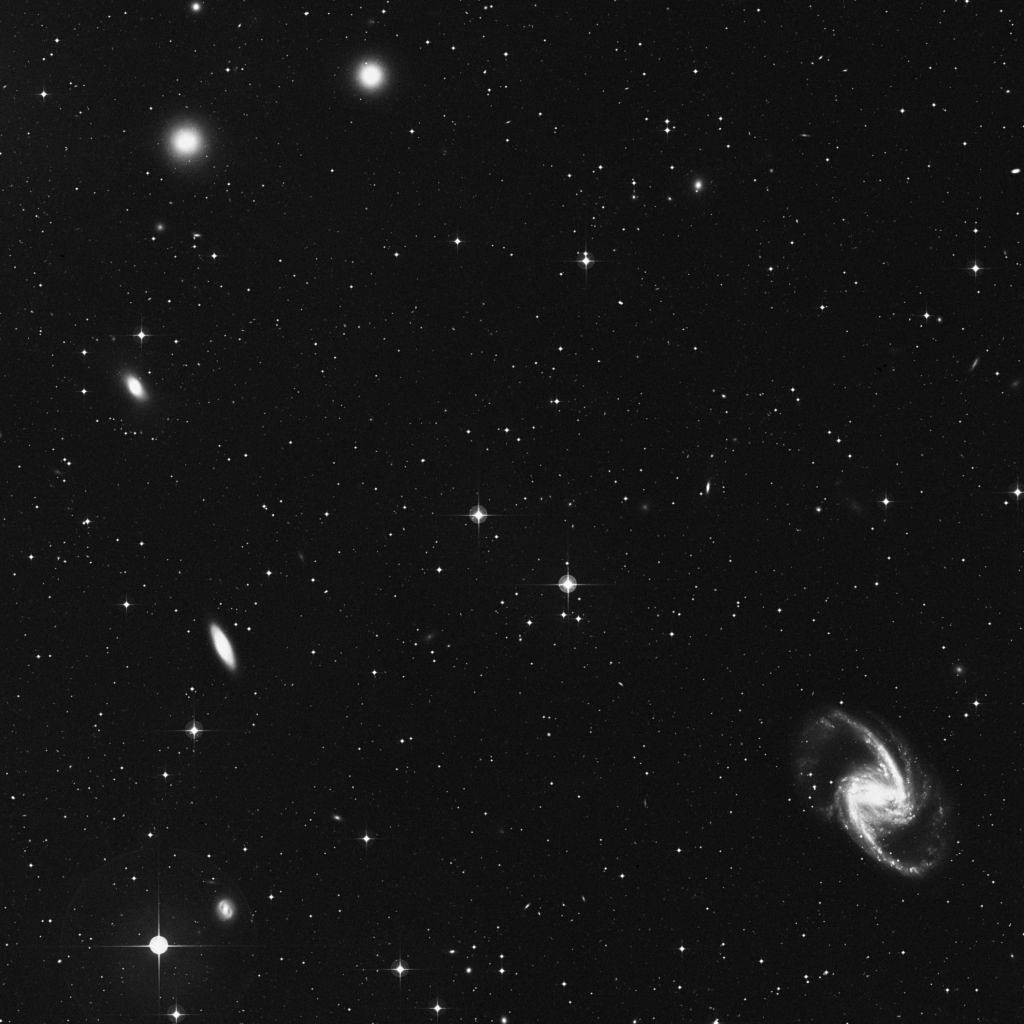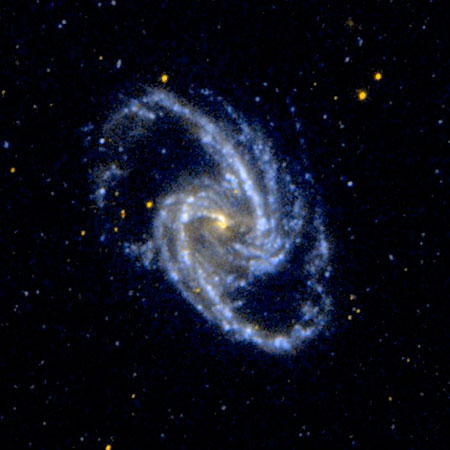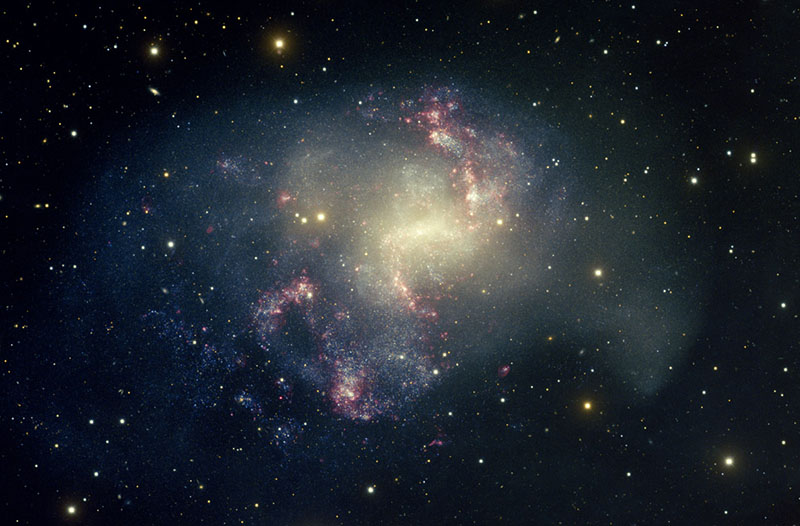Page 1 of 2
APOD: NGC 1365: Majestic Island Universe (2010 Aug 20)
Posted: Fri Aug 20, 2010 4:03 am
by APOD Robot
 NGC 1365: Majestic Island Universe
Explanation:
NGC 1365: Majestic Island Universe
Explanation: Barred
spiral galaxy NGC 1365 is truly a majestic
island universe some 200,000 light-years across. Located a mere 60 million light-years away toward the chemical constellation
Fornax, NGC 1365 is a dominant member of the well-studied
Fornax galaxy cluster. This impressively
sharp color image shows intense star forming regions at the ends of the bar and along the spiral arms, and details of dust lanes cutting across the galaxy's bright core. At the core lies a supermassive black hole. Astronomers think
NGC 1365's prominent bar plays a crucial role in the
galaxy's evolution, drawing gas and dust into a star-forming maelstrom and ultimately feeding material into the
central black hole.
[/b]
Re: APOD: NGC 1365: Majestic Island Universe (2010 Aug 20)
Posted: Fri Aug 20, 2010 4:15 am
by owlice
Gorgeous!! Love the write-up, too!
Re: APOD: NGC 1365: Majestic Island Universe (2010 Aug 20)
Posted: Fri Aug 20, 2010 4:22 am
by moonstruck
That is soo cool.

Re: APOD: NGC 1365: Majestic Island Universe (2010 Aug 20)
Posted: Fri Aug 20, 2010 4:30 am
by bystander
This galaxy looks perturbed. The spiral arms are far from symmetrical and there are shadow arms off to the right. Is there another galaxy close by with which this one is interacting?
Re: APOD: NGC 1365: Majestic Island Universe (2010 Aug 20)
Posted: Fri Aug 20, 2010 4:55 am
by Ann
bystander wrote:This galaxy looks perturbed. The spiral arms are far from symmetrical and the are shadow arms off to the right. Is there another galaxy close by with which this one is interacting?
Few spiral galaxies are perfectly symmetrical, if you ask me. Anyway, since NGC 1365 belongs to the Fornax cluster, even though it appears to sit in the outskirts of it, there are of course galaxies moderately nearby.

And in this ultraviolet GALEX image, NGC 1365 looks relatively symmetrical:

A very few galaxies are as symmetrical as NGC 2857, but there aren't many of them.

Ann
Re: APOD: NGC 1365: Majestic Island Universe (2010 Aug 20)
Posted: Fri Aug 20, 2010 5:34 am
by Boomer12k
We are all going "down the drain"!
Re: APOD: NGC 1365: Majestic Island Universe (2010 Aug 20)
Posted: Fri Aug 20, 2010 5:44 am
by biddie67
Seeing pictures like this makes me wonder which is the more common situation out there in the universe - galaxies with myriads of stars -or- the apparent enormous numbers of single stars out there by themselves.
Re: APOD: NGC 1365: Majestic Island Universe (2010 Aug 20)
Posted: Fri Aug 20, 2010 6:08 am
by bystander
Thanks, Ann. I do know that no galaxy is perfectly symmetrical. And I do know that NGC 1365 is part of the Fornax Cluster (I think I read that somewhere recently. Oh, yeah, APOD).
My comment was that this galaxy looks perturbed, more asymmetrical than the norm (whatever that is). There also seems to be a lot of new star activity (as evidence by GALEX). So, my question is, are there any galaxies close by with which this one may be (or may have been) interacting? It looks to me like it may be recovering from a recent close encounter.
Maybe it's just a young galaxy that hasn't filled out yet. I don't know, but your answer doesn't really address my question.
Re: APOD: NGC 1365: Majestic Island Universe (2010 Aug 20)
Posted: Fri Aug 20, 2010 6:50 am
by FrogSplash
Why can't we just name galaxies, instead of numbering them? We named the Andromeda Galaxy And our own The Milky Way galaxy. Is it that we are afraid of the alien life forms in other galaxies? Same way with stars. I think it would be easier if Stars didn't have numbers but names.
FS
Re: APOD: NGC 1365: Majestic Island Universe (2010 Aug 20)
Posted: Fri Aug 20, 2010 7:23 am
by nothingbutcontainedenergy
Island universe? are there many universe
Re: APOD: NGC 1365: Majestic Island Universe (2010 Aug 20)
Posted: Fri Aug 20, 2010 7:52 am
by Ann
biddie67 wrote:Seeing pictures like this makes me wonder which is the more common situation out there in the universe - galaxies with myriads of stars -or- the apparent enormous numbers of single stars out there by themselves.
There are definitely stars "out there in the wilderness", which have been thrown out of their galaxies. My impression, however, is that by far most stars are to be found inside galaxies. The bright and seemingly isolated stars that you can see in almost all galaxy images all belong to our own galaxy, so they are indeed inside a galaxy - they are inside the Milky Way.
Ann
Re: APOD: NGC 1365: Majestic Island Universe (2010 Aug 20)
Posted: Fri Aug 20, 2010 12:58 pm
by orin stepanek
FrogSplash wrote:Why can't we just name galaxies, instead of numbering them? We named the Andromeda Galaxy And our own The Milky Way galaxy. Is it that we are afraid of the alien life forms in other galaxies? Same way with stars. I think it would be easier if Stars didn't have numbers but names.
FS
there are billions and billions of galaxies and each has billions and billions of stars! Naming them all would be quite a feat!

other galaxies do have names though; like the Whirlpool and the Sombrero for example.
Re: APOD: NGC 1365: Majestic Island Universe (2010 Aug 20)
Posted: Fri Aug 20, 2010 1:19 pm
by WildGuruLarry
orin stepanek wrote:there are billions and billions of galaxies and each has billions and billions of stars! Naming them all would be quite a feat!

other galaxies do have names though; like the Whirlpool and the Sombrero for example.
Quite easy, actually... just name them all
George.
Personally I don't mind the numbers... although being a mathematician/computer guy, maybe I'm just more comfortable with them.
Re: APOD: NGC 1365: Majestic Island Universe (2010 Aug 20)
Posted: Fri Aug 20, 2010 2:16 pm
by Ravelin
nothingbutcontainedenergy wrote:Island universe? are there many universe
That's what I want to know. Could someone explain to me what is meant by "Island Universe", and what a "Chemical Constellation" is?
Re: APOD: NGC 1365: Majestic Island Universe (2010 Aug 20)
Posted: Fri Aug 20, 2010 2:39 pm
by Chris Peterson
Ravelin wrote:Could someone explain to me what is meant by "Island Universe", and what a "Chemical Constellation" is?
"Island Universe" was a popular term for galaxies around the time it was first recognized that they were actually large, distant objects and not merely nebulas, as once thought. It now now carries a poetic sense. The term "universe" in this case does not refer to
the Universe that contains everything.
The constellation of Fornax is named after the fornax chemica- a "chemical furnace" once used in labs. I guess that's the reference suggested by "chemical constellation".
Re: APOD: NGC 1365: Majestic Island Universe (2010 Aug 20)
Posted: Fri Aug 20, 2010 2:41 pm
by rstevenson
Ravelin wrote:nothingbutcontainedenergy wrote:Island universe? are there many universe
That's what I want to know. Could someone explain to me what is meant by "Island Universe", and what a "Chemical Constellation" is?
Island Universe is an archaic but still pleasant sounding term which simply means Galaxy. Using it instead of galaxy is just poetic licence.
[ Drat! Chris beat me to it. ]
Rob
Re: APOD: NGC 1365: Majestic Island Universe (2010 Aug 20)
Posted: Fri Aug 20, 2010 2:55 pm
by turtle
are spiral galaxies accretion discs for their black holes ? do all galaxies have black holes ?
Re: APOD: NGC 1365: Majestic Island Universe (2010 Aug 20)
Posted: Fri Aug 20, 2010 3:07 pm
by neufer
WildGuruLarry wrote:orin stepanek wrote:there are billions and billions of galaxies and each has billions and billions of stars! Naming them all would be quite a feat!

other galaxies do have names though; like the Whirlpool and the Sombrero for example.
Quite easy, actually... just name them all
George.
Do you think you are
William Herschel?
Here is my list of named galaxies:
- Ambartsumian's Knot (NGC 3561)
Andromeda Galaxy (M31 , NGC224)
Antennae Galaxies (NGC 4038 & NGC 4039)
Aquarius Dwarf
Arp's Galaxy
Atom For Peace Galaxy (NGC 7252)
Baade's Galaxies A & B
Baby Boom Galaxy
Barbon's Galaxy ( Markarian 328)
Barnard's Galaxy (NGC 6822)
Bear's Paw Galaxy (NGC 2537)
BL Lacertae
Black Eye/Sleeping Beauty Galaxy (M64, NGC 4826)
Bode's Galaxy (M81 , NGC3031)
Boötes Dwarf Galaxy
Burbidge Chain
Butterfly/Siamese Twins Galaxies (NGC 4567 & NGC 4568)
BW Tauri
Canis Major Dwarf
Capricorn Dwarf
Carafe/Cannon's Galaxy
Carina Dwarf
Cartwheel Galaxy
Centaurus A (NGC 5128)
Cigar Galaxy (M82)
Circinus Galaxy
Coddington's Nebula (IC 2574)
Comet Galaxy
Copeland Septet (NGC 3745+)
Cygnus A
Draco Dwarf
Exclamation Mark Galaxy
The Eyes (NGC 4435/8)
Fornax A (NGC 1316)
Fornax Dwarf
Fourcade-Figuero
The Garland (S of NGC 3077)
Grus Quartet (NGC 7552+)
Hardcastle's Galaxy
Helix Galaxy (NGC 2685)
Hercules A
Hoag's Object
Horologium Dwarf/Schuster's Spiral
Hydra A
Integral Sign Galaxy
Keenan's System (NGC 5216/6a/8)
Kowal's Object
Large Magellanic Cloud
Lindsay-Shapley Ring
Lost Galaxy (NGC 4535)
McLeish's Object
Mayall's Object
Mice Galaxies (NGC 4676)
Milky Way Galaxy
Miniature Spiral (NGC 3928)
Minkowski's Object (Arp 133)
Omega Centauri (the core of a dwarf galaxy the Milky Way cannibalized.)
Pancake (NGC 2685)
Papillon (IC 708)
Pegasus Dwarf
Perseus A (NGC 1275/6 03:19.8 +41:31
Phoenix Dwarf Irregular Galaxy
Pinwheel Galaxy (M101, NGC 5457)
Pisces Cloud (NGC 379)
Pisces Dwarf
Polarissima Australis (NGC 2573)
Polarissima Borealis (NGC 3172)
Reinmuth 80 (NGC 4517a)
Reticulum Dwarf
Sagittarius Dwarf Elliptical Galaxy (M54)
Sculptor Dwarf
Sculptor Dwarf Irregular
Seashell Galaxy (Companion to NGC 5291)
Serpens Dwarf
Sextans A
Sextans B
Sextans C
Seyfert's Sextet (NGC 6027)
Silver Coin Galaxy (NGC 253)
Small Magellanic Cloud (NGC292)
Sombrero Galaxy (M104)
Starfish Galaxy (NGC 6240, recently coalesced galaxy with 2 nuclei.)
Sunflower Galaxy (M63, NGC 5055)
Spider (DDO 84)
Spindle Galaxy (NGC 3115)
Stephan's Quintet (NGC 7317-20)
Tadpole Galaxy
Triangulum Galaxy (M33 , NGC598)
Ursa Minor Dwarf
Virgo A (M87, NGC 4486)
Virgo Pinwheel (M99)
Virgo Stellar Stream (a dwarf galaxy the Milky Way cannibalized.)
Whirlpool Galaxy (M51)
Wild's Triplett (Arp 248)
Wolf-Lundmark-Melotte (DDO 221)
Zwicky's Triplet (UGC 10586)
Re: APOD: NGC 1365: Majestic Island Universe (2010 Aug 20)
Posted: Fri Aug 20, 2010 3:17 pm
by Chris Peterson
turtle wrote:are spiral galaxies accretion discs for their black holes ? do all galaxies have black holes ?
No, the material in a spiral galaxy is not accreting onto the central black hole. The gravitational influence of even the largest supermassive black holes is small within a galaxy, and the region where they strongly influence local stars or might support an accretion disc is only a few light years across (compared with tens of thousands of light years for typical galactic diameters).
Most galaxies appear to have central black holes, but not all. Many are "inactive" in the sense that there isn't enough material around them to support an accretion disc, so they are difficult to detect.
APOD: NGC 1365: Majestic Island Universe (2010 Aug 20)
Posted: Fri Aug 20, 2010 7:46 pm
by Guest
Wow
200,000 light years across??? How big is that?? That is so cool! Goes to show how tiny we are!

--
FrogSplash wrote:Why can't we just name galaxies, instead of numbering them? We named the Andromeda Galaxy And our own The Milky Way galaxy. Is it that we are afraid of the alien life forms in other galaxies? Same way with stars. I think it would be easier if Stars didn't have numbers but names.
FS
Religious references removed (Rule 14).
Please read the rules before posting!
Re: APOD: NGC 1365: Majestic Island Universe (2010 Aug 20)
Posted: Fri Aug 20, 2010 8:14 pm
by Ann
bystander wrote:Thanks, Ann. I do know that no galaxy is perfectly symmetrical. And I do know that NGC 1365 is part of the Fornax Cluster (I think I read that somewhere recently. Oh, yeah, APOD).
My comment was that this galaxy looks perturbed, more asymmetrical than the norm (whatever that is). There also seems to be a lot of new star activity (as evidence by GALEX). So, my question is, are there any galaxies close by with which this one may be (or may have been) interacting? It looks to me like it may be recovering from a recent close encounter.
Maybe it's just a young galaxy that hasn't filled out yet. I don't know, but your answer doesn't really address my question.
Sorry if I offended you. I take a special interest in galaxies, at least spiral and to some extent irregular galaxies, because I often find them beautiful. And because I take this special interest in galaxies, I am aware that some of my favorite galaxies are disturbed, and violently starforming, for no obvious reason. A typical example is NGC 1313, which sits fairly isolated in space, and yet is bursting with new stars and a tortured shape.

A relatively large spiral galaxy, which is also more disturbed-looking than it has any obvious "right" to be, is M99:

A galaxy which is extremely symmetrical is NGC 488. This galaxy does appear to be quite lonely in space.

And there is also NGC 4622:

But it isn't always so obvious why galaxies have the shapes they do.
Ann
Re: APOD: NGC 1365: Majestic Island Universe (2010 Aug 20)
Posted: Fri Aug 20, 2010 8:28 pm
by bystander
Ann wrote:Sorry if I offended you.
No offense taken. Looking at my post, I can see where you might have thought that. For that, I apologize. It's just that your post wasn't particularly helpful and it was late
(no excuse).
It's all good.

From a link in the APOD,
Fornax galaxy cluster (thanks owlice), it is apparent that there is a lot of interaction within the cluster. But I still don't know why NGC 1365 looks so unsettled.
Re: APOD: NGC 1365: Majestic Island Universe (2010 Aug 20)
Posted: Fri Aug 20, 2010 8:42 pm
by neufer
FrogSplash wrote:
I think it would be easier if Stars didn't have numbers but names.
Finnegans Wake: Page 104
In the name of Annah the Allmaziful, the Everliving,
the Bringer of Plurabilities, haloed be her eve,
her singtime sung, her rill be run, unhemmed as it is uneven!
Her untitled mamafesta memorialising the Mosthighest
has gone by many names at disjointed times:
http://www.naic.edu/~gibson/starnames/starnames.html
Re: APOD: NGC 1365: Majestic Island Universe (2010 Aug 20)
Posted: Fri Aug 20, 2010 8:44 pm
by Guest
Beautiful gallaxy

Does anyone know how far 200,000 lightyears is?? I'd like to know...
-H-
Re: APOD: NGC 1365: Majestic Island Universe (2010 Aug 20)
Posted: Fri Aug 20, 2010 8:49 pm
by bystander
Guest wrote:Beautiful gallaxy

Does anyone know how far 200,000 lightyears is?? I'd like to know...
A
light-year, also light year or lightyear, (symbol: ly) is a unit of length, equal to just under 10 trillion kilometres (10
16 metres, 10 petametres or 6 trillion miles). As defined by the International Astronomical Union (IAU), a light-year is the distance that light travels in a vacuum in one Julian year.
So, multiply that by 200,000 ... 2*10
21 meters or 1.2*10
21 miles.
 NGC 1365: Majestic Island Universe
NGC 1365: Majestic Island Universe





